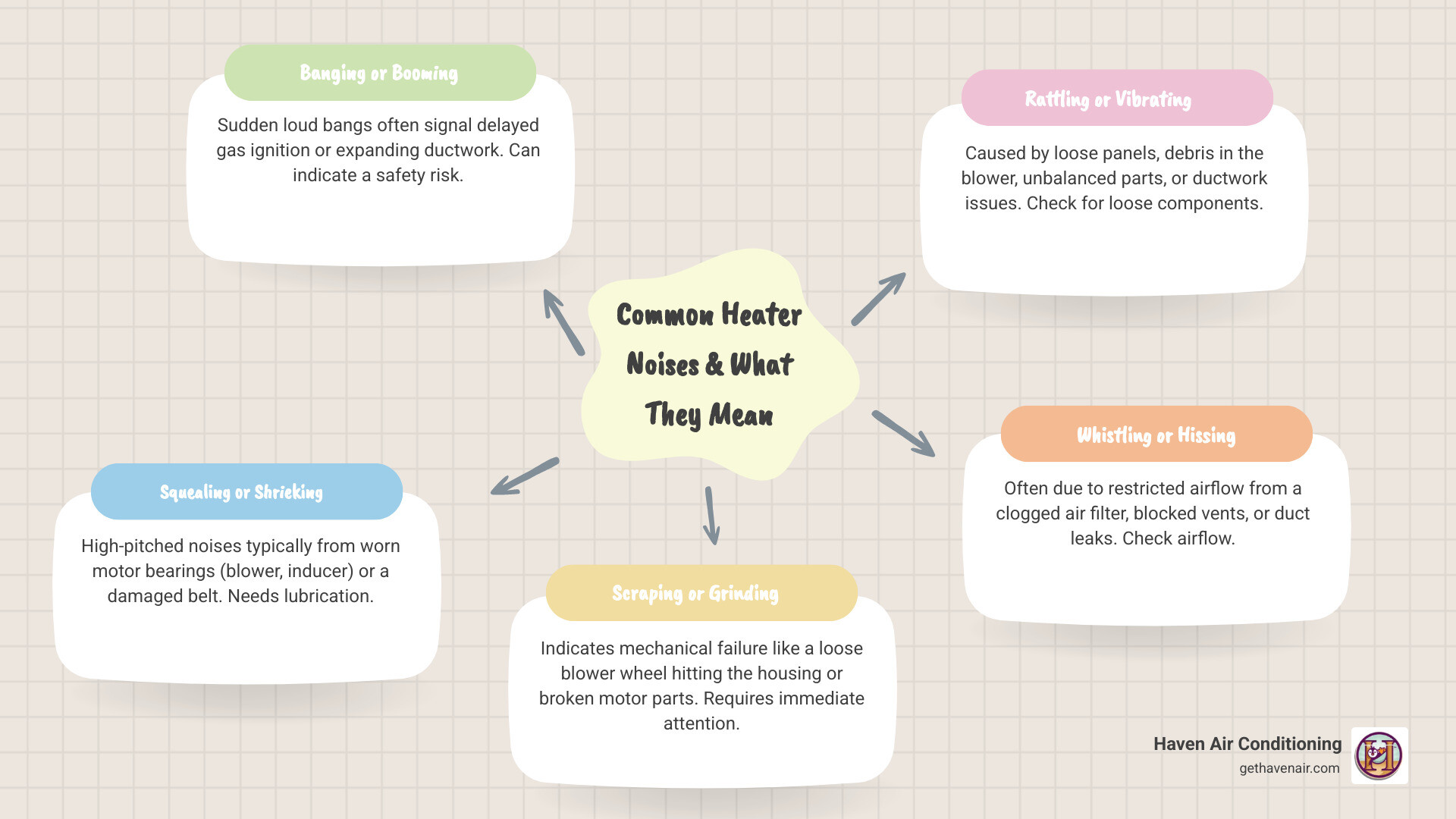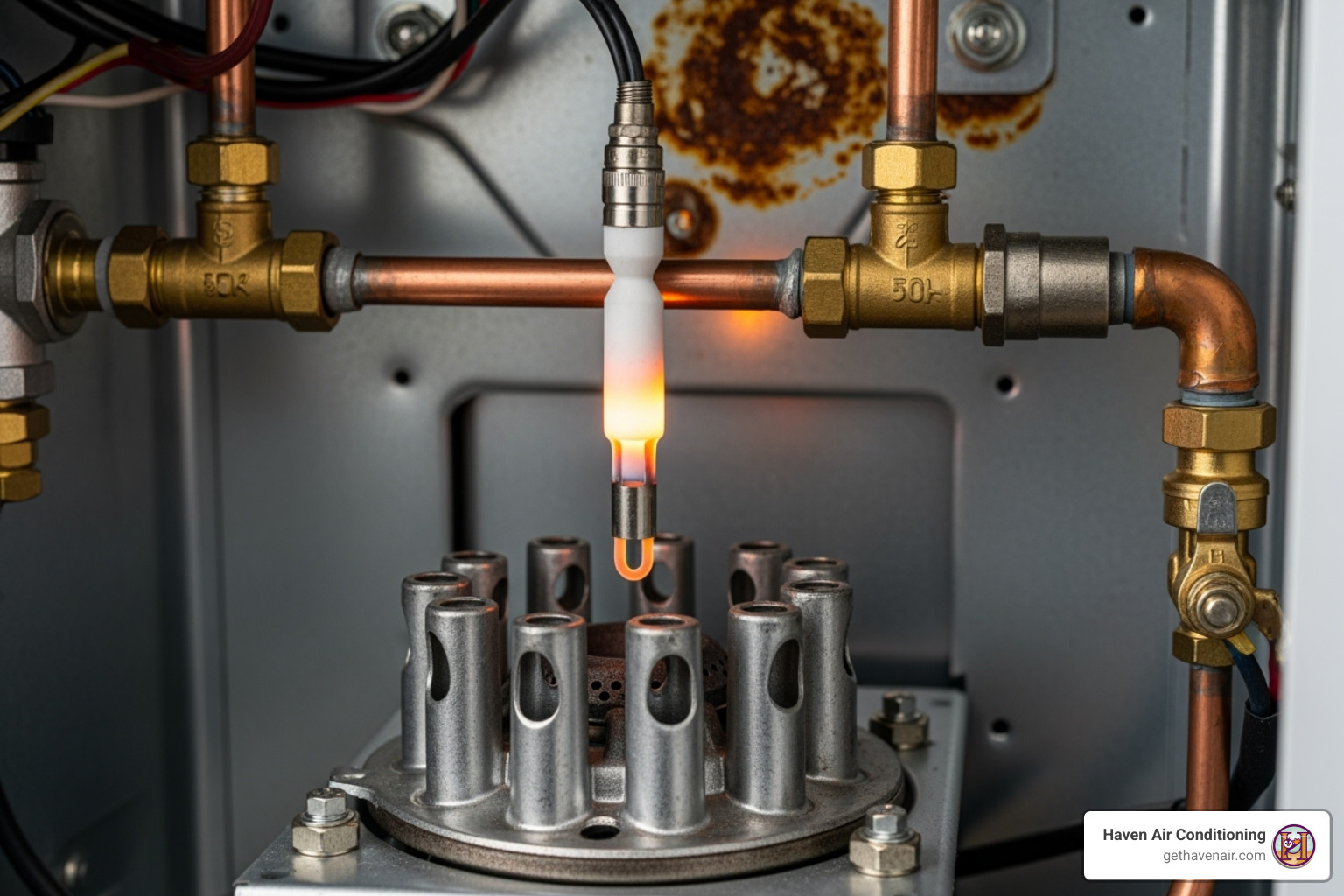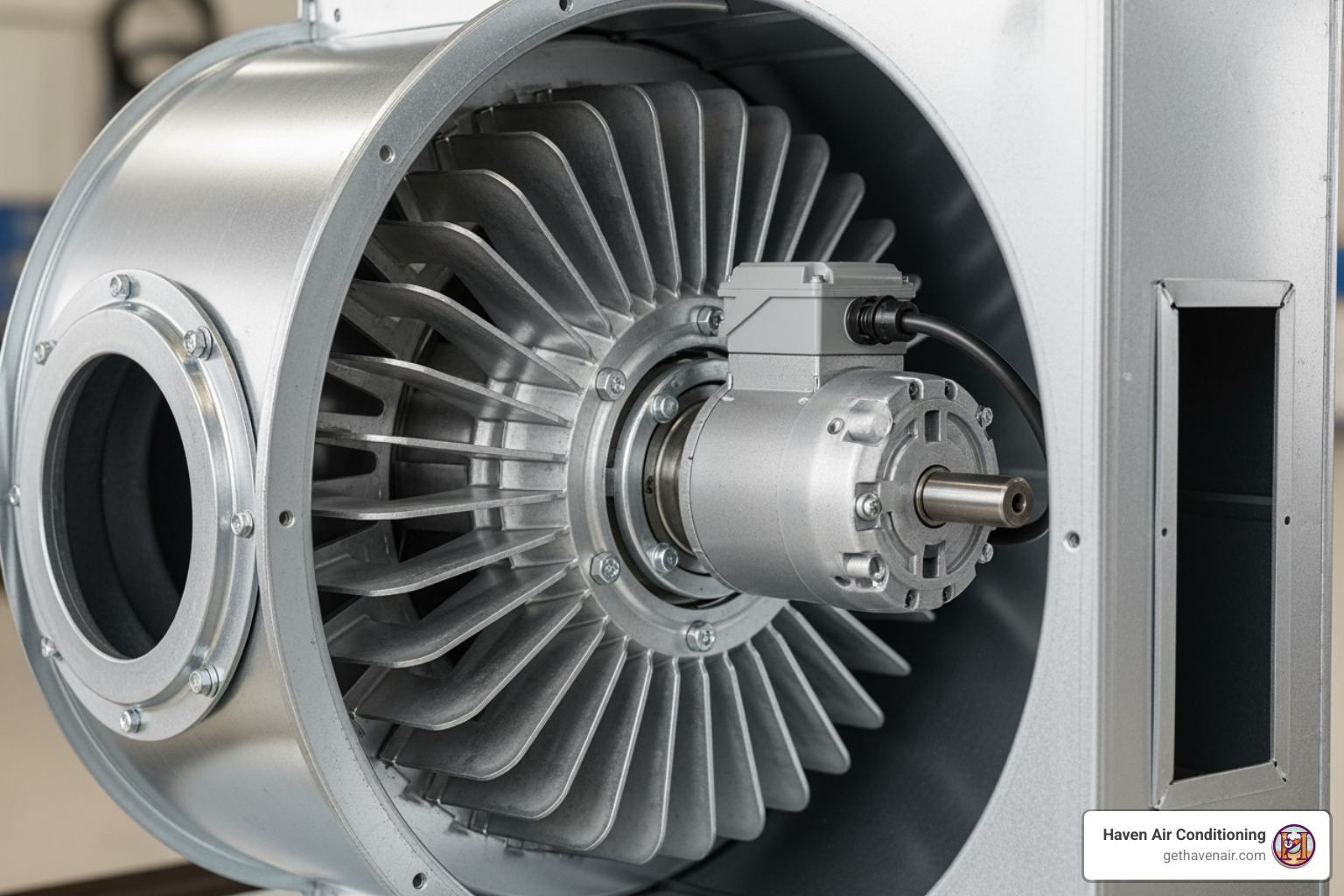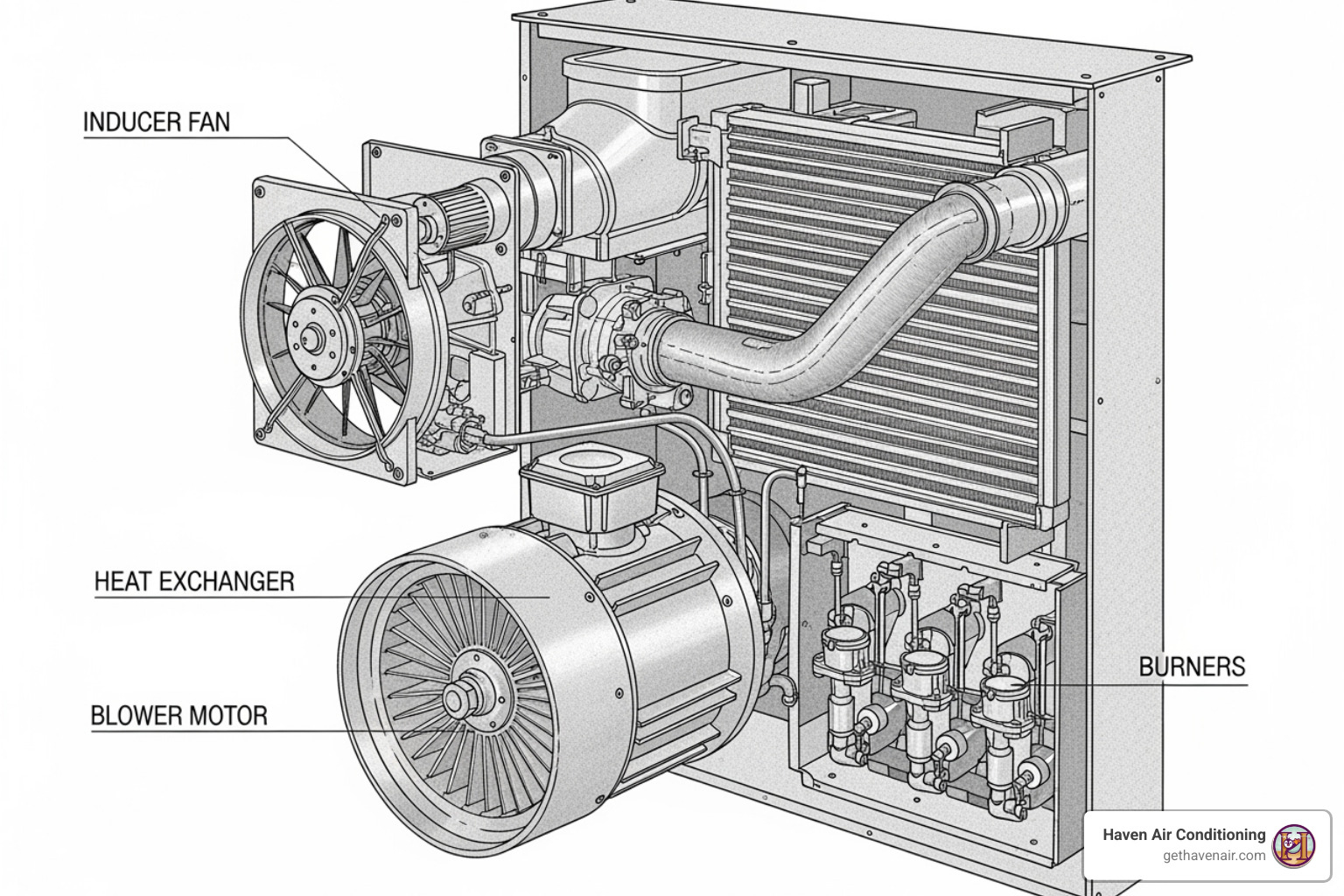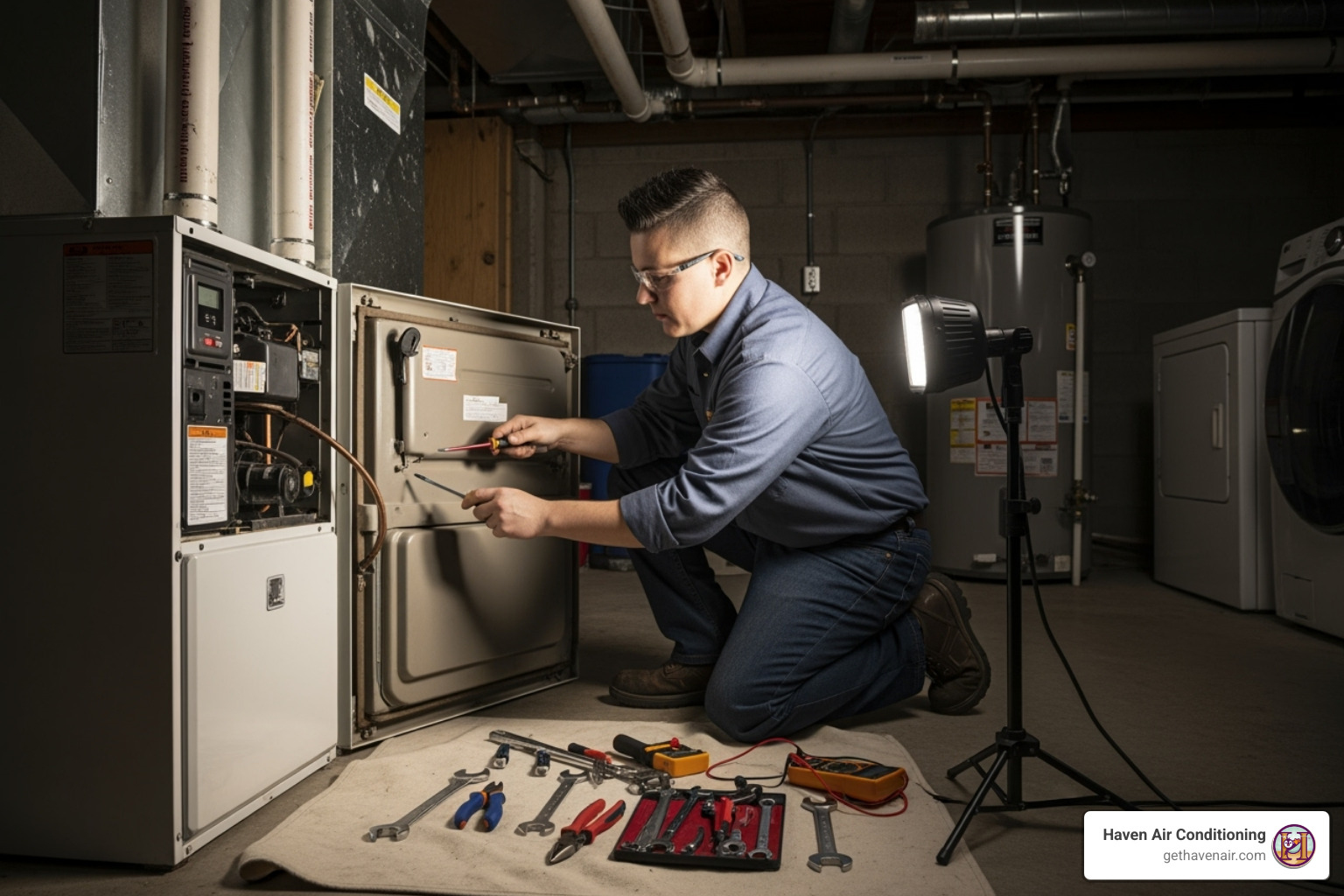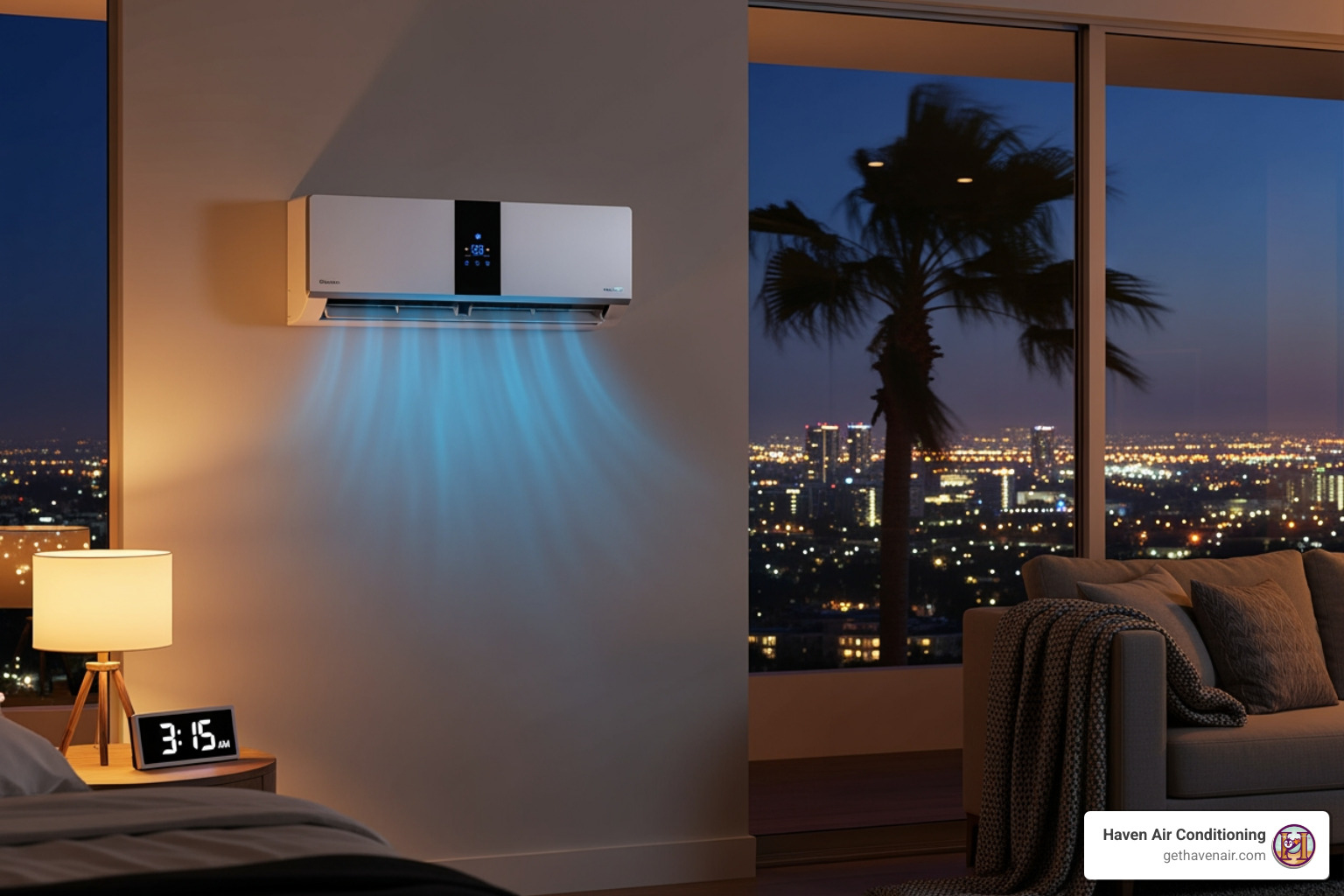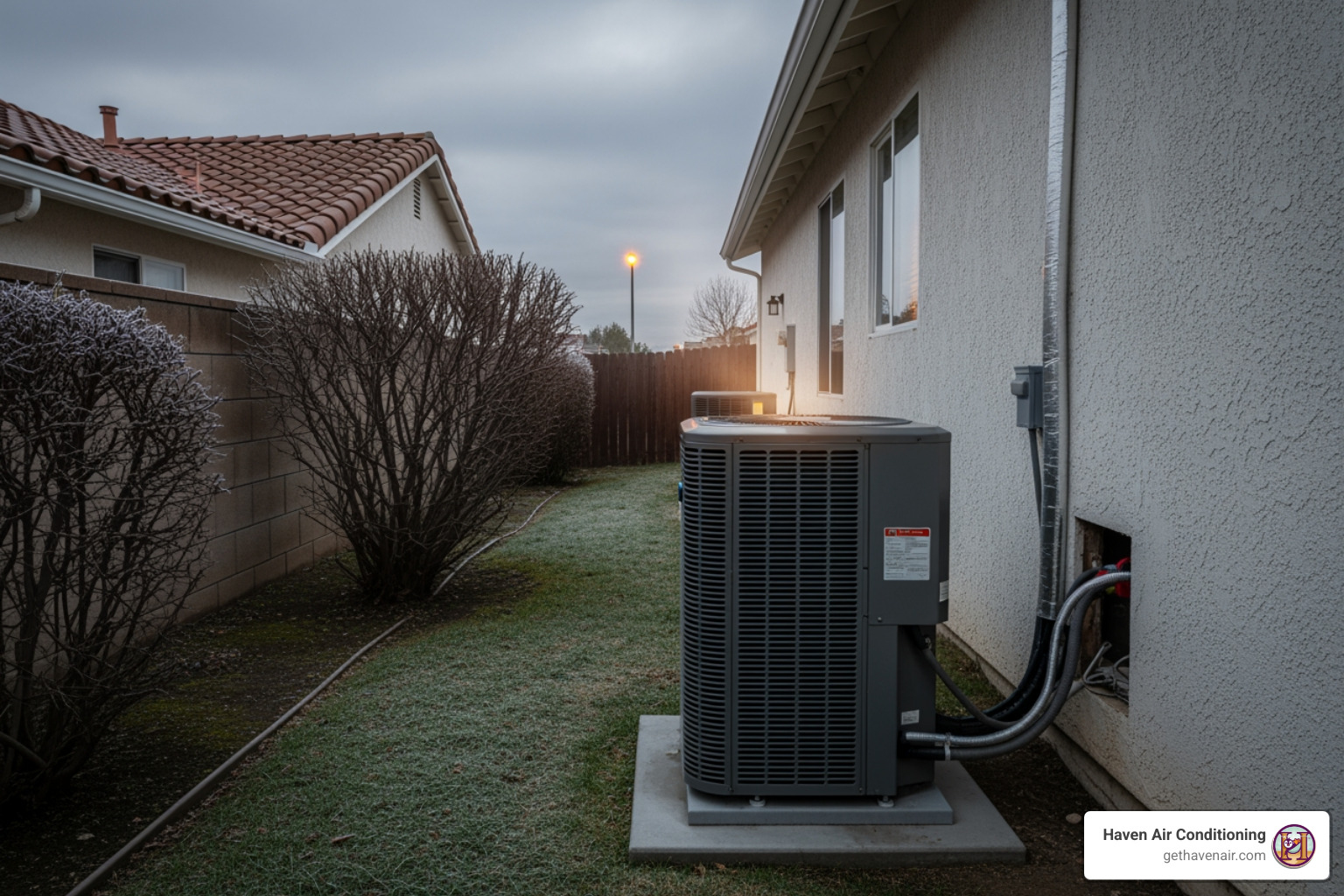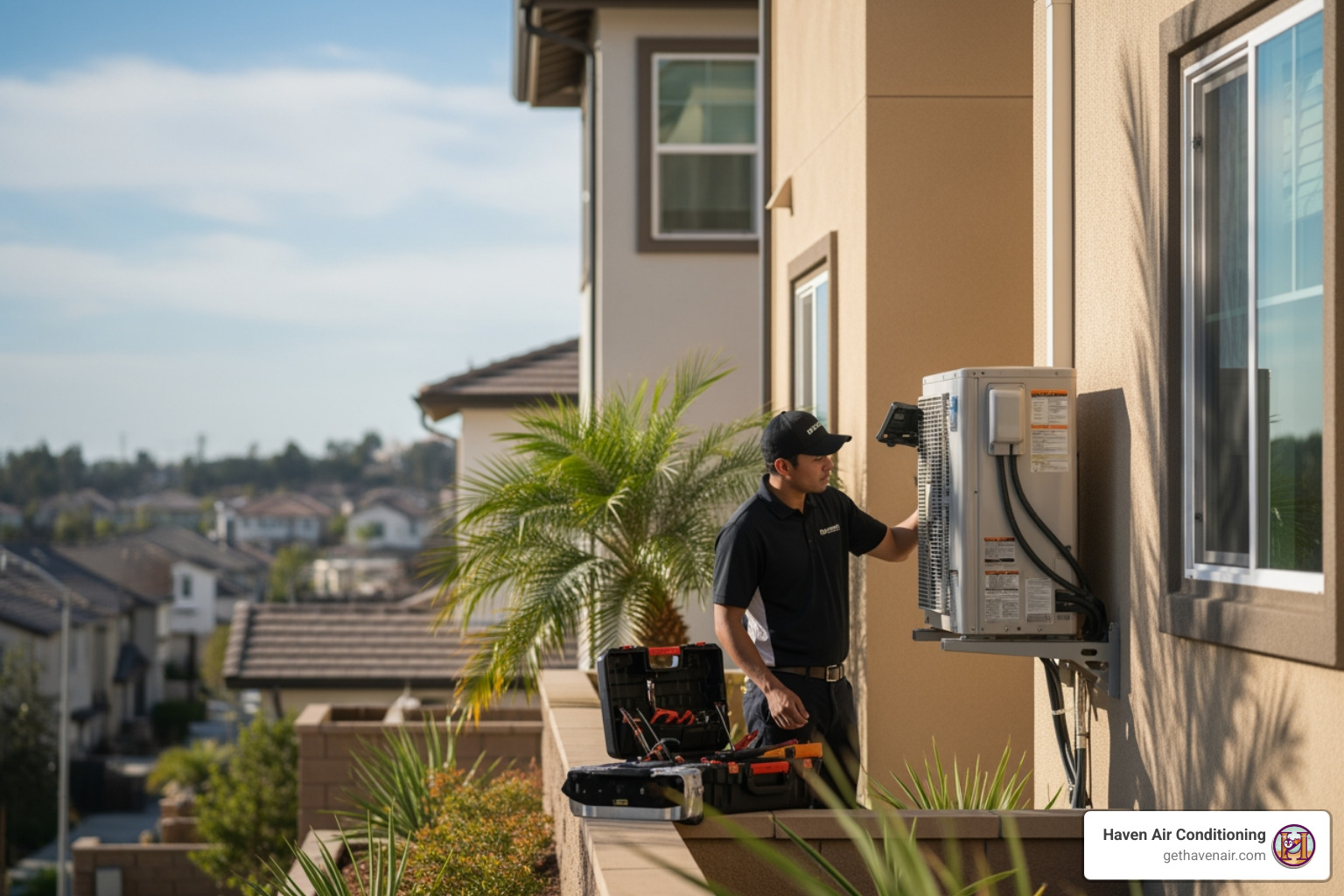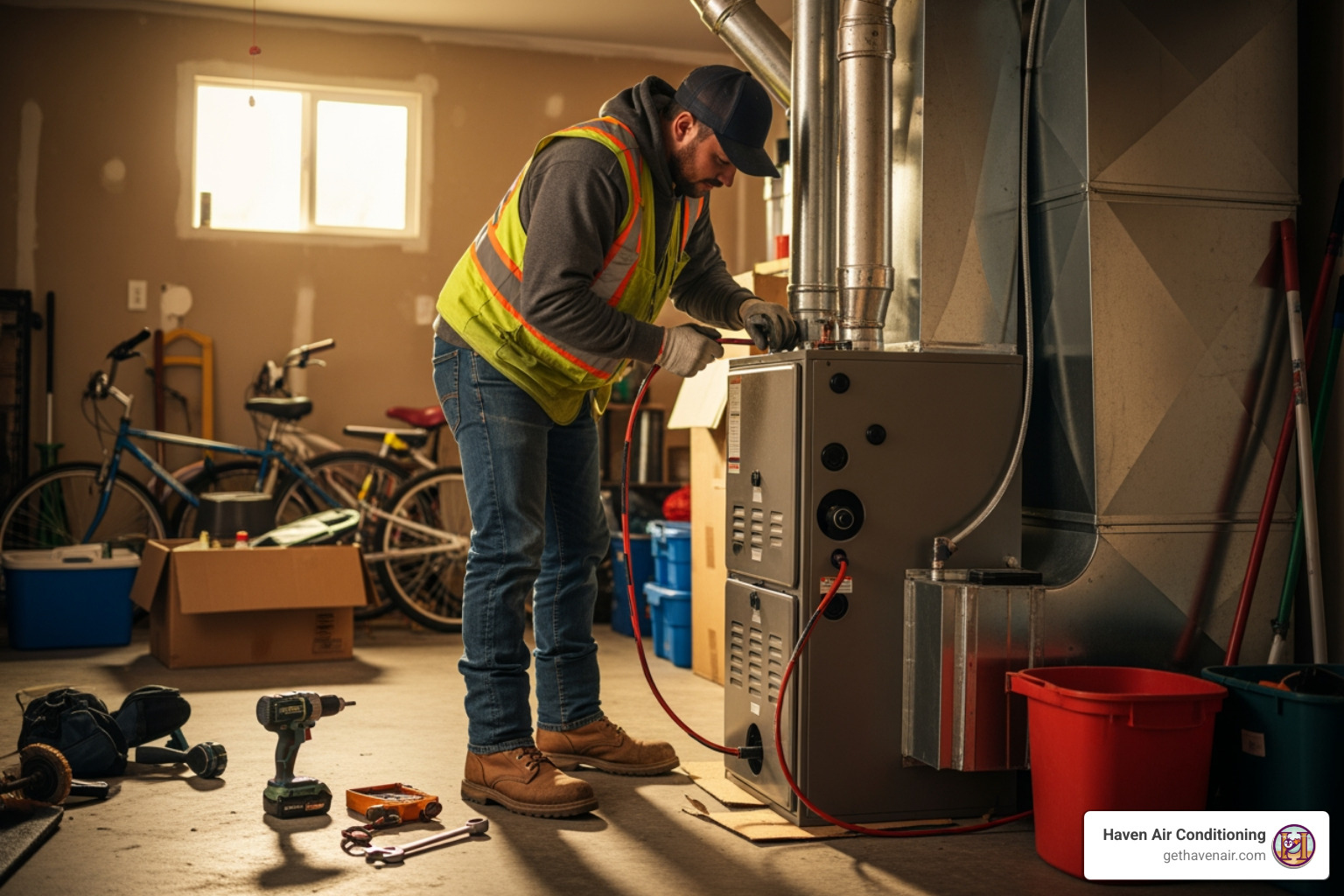When Your Heater Becomes a Noisemaker: Understanding the Problem
When a heater making loud noise disrupts your home, it’s more than an annoyance—it’s your heating system crying out for help. An unexpected bang, persistent rattle, or high-pitched squeal isn’t something to ignore.
Common heater noises and what they typically mean:
- Banging/Booming – Delayed gas ignition or expanding ductwork
- Squealing/Shrieking – Worn motor bearings or damaged belts
- Scraping/Grinding – Loose blower wheel or broken motor parts
- Rattling/Vibrating – Loose panels or debris in the system
- Whistling/Hissing – Clogged air filter or airflow restrictions
When it comes to your heater, strange sounds are genuine pleas for attention. Most heating system noises indicate a loose or broken part that needs care. While gentle whooshing is normal, loud or unusual noises often signal problems that can lead to expensive repairs, system breakdowns, or even safety hazards if left unchecked.
The good news? Many noisy heater problems have straightforward solutions when you know what to look for and when to take action.
Decoding the Cacophony: A Guide to Common Heater Noises
When your heating system makes strange sounds, each noise tells a story about its internal condition. Let’s decode these sounds so you can understand what your heater making loud noise is trying to tell you.
Banging or Booming: What to do when your heater making loud noise is a sudden shock
A sudden BANG! from your furnace room is startling. If your heater making loud noise sounds like a small explosion, you’re dealing with a potentially serious heating system problem.
The most concerning cause is delayed ignition. Gas builds up in the combustion chamber due to dirty burners or a weak pilot light. When it finally ignites, the mini-explosion can damage your heat exchanger or create a fire hazard.
Expanding ductwork creates a different kind of banging. These sounds usually happen after your furnace kicks on as metal ducts expand. While less alarming, persistent duct banging can signal airflow problems like clogged filters or blocked vents.
If you hear these explosive sounds, especially at startup, don’t wait. Check our guide on common furnace problems or review the signs you need expert furnace repair to know when professional help is essential.
Squealing or Shrieking
High-pitched squeals or shrieks are your heating system’s cry for help. These ear-piercing sounds demand attention.
Worn motor bearings are the usual culprit. Your blower and inducer motors rely on smooth bearings to operate quietly. When they wear down, metal grinds against metal, creating that unmistakable squeal.
Damaged belts in older furnaces can also shriek as they slip or fray. Catching these sounds early usually means a simple fix rather than a complete motor replacement.
Your furnace has several components that need regular lubrication: blower motor bearings, inducer motor bearings, and drive belts in older systems.
Scraping or Grinding: Why this heater making loud noise needs immediate attention
If your furnace makes a scraping or grinding sound, turn it off immediately. This metal-on-metal noise means the system is destroying itself from the inside.
The blower wheel, the fan that pushes heated air through your home, is usually the source. If the wheel comes loose or its mounting hardware breaks, it scrapes against the blower housing. Worn ball bearings can also throw the assembly out of alignment.
Sometimes broken motor mount bolts get caught in the spinning fan, creating a grinding sound. Letting this continue risks complete system failure.
This is not a “wait and see” situation. Turn off your furnace and call for help. Our team provides reliable heater repair services and understands that grinding sounds mean urgent action is needed.
Rattling or Vibrating
Rattling might seem less dramatic, but it still signals that something needs attention. These sounds often indicate loose or imbalanced parts that can lead to bigger problems.
Loose access panels are the simplest explanation. Debris in your blower can also be tossed around by the fan, creating rattling or thumping sounds.
More concerning is an unbalanced or loose blower wheel, which can cause the entire furnace to shake. This puts extra stress on motor bearings and can lead to serious mechanical failures.
The most serious cause is a cracked heat exchanger. This critical component can rattle as it heats and expands. A cracked heat exchanger is a major safety hazard because it can leak dangerous carbon monoxide into your home.
Ductwork issues like loose joints or dented ducts can also rattle and vibrate. For a comprehensive understanding, explore our guide to common furnace problems.
Whistling or Hissing
Whistling or hissing sounds usually indicate an airflow problem. These noises occur when air is forced through a restriction or escapes from a leak.
Clogged air filters are the most common cause. A packed filter makes your furnace work harder to pull in air, creating a high-pitched whistle.
Blocked vents or closed dampers can create back pressure that leads to whistling. If too many vents are closed, your system can’t move air properly.
Duct leaks create hissing sounds as conditioned air escapes. This wastes energy and money and can stress your entire system.
Sometimes whistling indicates undersized ductwork that can’t handle your furnace’s airflow. When air squeezes through ducts that are too small, it creates noise.
While not usually immediate safety concerns, these sounds signal efficiency problems that will cost you money if ignored.
Why is My Heater Making Loud Noise? The Culprits Behind the Clamor
Understanding the key components of your furnace can help you pinpoint the source of the problem.
When a component in your heating system fails, the resulting noise can be loud and unpleasant. This is what happens when your heater making loud noise disrupts your home’s atmosphere.
Your furnace is a team of components working together. The blower motor orchestrates the movement of heated air. When it has worn bearings or an unbalanced blower wheel, it can make screeching, grinding, or rattling sounds. If it’s struggling due to a dirty filter, it works harder and creates more noise.
The inducer fan turns on before the burners to safely vent combustion gases outside. When its bearings wear out or the motor is damaged, you might hear screeching, rattling, or a “jackhammer-like” vibration.
The heat exchanger transfers heat from combustion gases to the air that warms your home. A cracked heat exchanger can create rattling sounds as it heats up. More importantly, this is a serious safety issue as it can allow carbon monoxide to leak into your home.
Your burners ignite the gas to create heat. When they get dirty, they can cause delayed ignition, leading to startling banging or booming sounds. Sediment buildup can also create popping noises.
The ductwork throughout your home is the delivery system for heated air. Metal ducts naturally expand and contract, which can cause some banging. However, loose joints, blockages, or leaks can create rattling, whistling, or hissing sounds.
Capacitors are small electrical components that power your motors. When they fail, they can cause motors to hum loudly or struggle to start.
Finally, your pilot light or ignition system lights the burners. A weak pilot or failed electronic ignition can lead to delayed ignition and loud banging sounds. You might also hear clicking from a malfunctioning ignition system.
Each component has its own “voice.” Learning to recognize these sounds helps you understand what your furnace is trying to tell you. For detailed information about professional repair approaches, check out our guide on HVAC Repair Techniques by Our Professionals.
Your First Line of Defense: DIY Troubleshooting for a Noisy Heater
Before calling a professional, a few safe and simple steps can sometimes silence the noise. Many common heater noises stem from basic maintenance issues you can tackle yourself without special tools or technical expertise.
Start with your air filter, the most common cause of heater noise. A clogged filter forces your system to work overtime, often creating whistling sounds or making the blower motor noticeably louder. Check your filter monthly and replace it every one to three months.
Next, walk around your furnace and gently press on all access panels. Vibration can loosen these panels, and a simple rattle might just need a firm push or a quick tightening of a screw.
Clear the path for proper airflow by checking every vent and return air grille. A couch pushed against a return vent or a basket over a floor register could be causing a whistle. Ensure nothing is blocking these openings.
Isolate the noise by switching your thermostat to “FAN ON” without heat. If you hear the noise, it’s likely the main blower. If it only happens when the burners are running, it’s probably the inducer fan or a combustion issue.
Finally, try a system reset. Reset your system by flipping the emergency shut-off switch (usually near your furnace) off for 30 seconds, then back on. Sometimes minor electrical glitches cause unusual noises, and a reset can clear them up.
If these steps don’t quiet things down—or if you’re uncomfortable performing them—don’t hesitate to call the experts. Our team at Haven Air Conditioning provides professional Heating Repair services throughout the Greater Orange County Area.
When to Call the Pros: Recognizing Signs You Need Expert Heater Repair
While some heater noises have DIY fixes, others are red flags demanding immediate professional attention. Think of these sounds as your furnace’s alarm system—when they go off, act quickly.
Signs You Need to Call for Help Immediately
Some situations with a heater making loud noise aren’t worth the risk of fixing yourself. These warning signs indicate serious problems that could lead to expensive damage, system failure, or safety hazards.
Grinding or scraping sounds are the most urgent noise. When metal parts grind against each other, something is seriously wrong and getting worse by the minute. This usually means a loose blower wheel or failed motor bearings. Turn off your system immediately and call for help.
Persistent loud banging or booming, especially at startup, signals dangerous delayed gas ignition. Gas builds up before igniting in a small explosion. This is hazardous and can damage your heat exchanger or create fire risks.
If you smell gas or burning odors with strange noises, treat it as an emergency. A rotten egg smell (natural gas) or burning plastic/electrical odors mean you should turn off your gas supply, open windows, leave your home, and call your gas company and an HVAC professional. Do not investigate the source yourself.
No heat production combined with unusual noises often indicates a major system malfunction. This suggests critical components have failed and need professional diagnosis.
System cycling frequently—turning on and off repeatedly—puts tremendous strain on your equipment. When this happens with unusual noises, it often means multiple systems are failing.
Trust your instincts. If a noise makes you feel unsafe, call for professional help. Our certified technicians can safely diagnose complex problems. Understanding Why Hire Certified HVAC Technicians? can help you feel confident in your decision.
Repair vs. Replacement
Sometimes the question isn’t just how to fix a noisy heater, but whether fixing it makes financial sense. This is especially important when your furnace starts making expensive sounds.
Furnace age is a major factor. Most furnaces last 15-20 years. If your 18-year-old furnace needs a costly repair, you might be better off putting that money toward a new, more efficient system.
Rising energy bills often accompany noises from older furnaces. As components wear down, your system works harder and uses more energy.
Frequent repairs are another telling sign. If you’ve needed service multiple times recently and now your heater making loud noise again, you may have an aging system entering its breakdown phase.
Inconsistent heating, combined with furnace noises, suggests your system is losing its ability to do its job. Cold spots often mean the furnace is struggling with performance issues.
A new furnace is a significant investment, but it can deliver savings through improved efficiency and reliable, quiet operation. For guidance, check our guide on When to Consider HVAC Replacement.
The Sound of Silence: How Regular Maintenance Prevents Noisy Problems
Regular maintenance is the best way to prevent a heater making loud noise. It’s more effective and cheaper than waiting for problems to announce themselves with bangs, squeals, and grinding sounds.
Annual maintenance is like a yearly physical for your furnace. Technicians can spot trouble before it starts, catching worn bearings before they squeal, identifying loose components before they rattle, and cleaning dirty burners before they cause delayed ignition.
One of the most important aspects of maintenance is component lubrication. Your furnace’s moving parts—blower motor bearings, inducer fan bearings—need proper lubrication to run quietly. Without it, metal rubs against metal, creating friction and squealing sounds. A technician will ensure these parts are properly oiled.
System cleaning is another crucial piece of the puzzle. A dirty blower wheel can become unbalanced and cause vibration. Clogged burners can lead to uneven heating and delayed ignition. A clean system runs more quietly and efficiently.
The safety inspections included with regular maintenance protect your family. Technicians check for cracked heat exchangers, gas leaks, and proper ventilation. A cracked heat exchanger doesn’t just rattle; it can leak dangerous carbon monoxide into your home. According to the EPA, carbon monoxide is a serious health risk that can be prevented with proper appliance maintenance. These inspections ensure your system operates safely and quietly.
Perhaps most importantly, regular maintenance is your best strategy for preventing breakdowns. By addressing small issues during routine maintenance, you can avoid emergency breakdowns and the stress of being without heat when you need it most.
The investment in annual maintenance pays dividends in comfort, efficiency, and peace of mind. To understand more about why these check-ups are so crucial, explore our resources on Learn about the importance of furnace inspections and Furnace Repair Ensure Safe Home Heating.
A well-maintained furnace is a quiet furnace. Give it the care it deserves, and it’ll reward you with years of whisper-quiet warmth.
Don’t Let a Noisy Heater Disrupt Your Peace
Your home should be a place of quiet comfort, not a source of unwanted noise from your heater. When your heater making loud noise starts disrupting the peace, it’s easy to hope the sounds will go away, but that’s rarely the case with HVAC systems.
Ignoring persistent bangs, squeals, or grinding sounds is like ignoring a check engine light. A minor issue can quickly snowball into a major problem, leaving you with a complete system breakdown and a much larger repair bill.
Your heater is communicating. Those noises are specific signals: a squeal may mean the blower motor needs lubrication, a bang can warn of gas buildup, and a scrape signals immediate internal damage is occurring.
Safety is another crucial concern. Some heating system noises can indicate serious hazards like gas leaks or carbon monoxide risks. When your furnace makes unusual sounds, especially combined with strange smells, it’s not just about comfort—it’s about protecting your family.
By identifying the type of noise and understanding what it means, you’re taking control. Whether it’s a simple fix like changing an air filter or a complex issue needing professional attention, knowing the difference empowers you to make the right choice.
The good news? You don’t have to face these challenges alone. When DIY troubleshooting reaches its limits, or when alarming sounds concern you, professional help is just a phone call away.
Schedule Your Heater Repair Today
For residents throughout the Greater Orange County Area, Haven Air Conditioning brings decades of experience and a commitment to restoring peace to your home. Our certified technicians understand that a heater making loud noise isn’t just a mechanical problem—it’s disrupting your daily life.
When you choose our team, you’re getting expert diagnosis that gets to the root of the problem quickly. We identify what’s causing the sounds and explain it in terms you can understand. Our safe repairs prioritize your family’s wellbeing and ensure your heating system operates reliably.
Our certified technicians have seen it all, from loose panels to complex motor failures. We’re equipped to handle any heating challenge. As your local Orange County service provider, we understand the unique demands our climate places on HVAC systems.
Whether you’re in Anaheim, Irvine, Santa Ana, or anywhere else in our service area, we’re committed to bringing that sweet sound of silence back to your home. Don’t spend another night wondering what that noise means.
Ready to reclaim the quiet comfort your home deserves? Schedule your heater repair in Anaheim, CA today, and let our friendly professionals restore harmony to your heating system.


